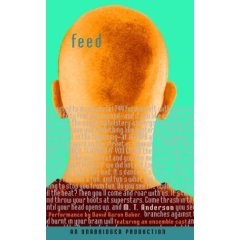
Feed by M. T. Anderson. Read by David Aaron Baker. (Listening Library)
This is the first in a series of audiobook reviews I wanted to share. In this young adult novel, Anderson presents a devastating satire and cautionary tale about what could happen when the worst tendencies of today's empty-headed, entertainment-obsessed consumerist popular culture are merged with the worst passive, mind numbing, dumbed-down tendencies of emerging information technologies. Titus and his friends, teens of the not-too-distant future, have lived their entire lives with the hardware and software needed to access the next generation of the internet--known simply as "The Feed"--wired directly into their brains. "Everything that happens, happens on the Feed," Titus says.
Feed subscribers are bombarded with a constant stream of images, sounds, and slogans, all promising them one entertainment experience after another, each more fabulous than the last, and all carefully crafted to persuade them to be avid and mindless consumers. The Feed is the first thing they wake up to in the morning and the last thing they hear before going to sleep at night. Entertainment is even more vacuous than it is today (The most popular "feedcast" is a reality show called "Oh. Wow. Thing."), and information, such as it is, is delivered without depth or context. The Feed can be customized for each individual subscriber, isolating individuals from each other in their own computer-generated worlds. Schools, which exist principally for the purpose of creating not-so-smart shoppers, are run by corporations that can replace live teachers with holograms as a cost-cutting measure.
Using the Feed's computer networks, Titus and his friends can have access to practically any piece of information, but this very ease of access and the flood of information at their virtual fingertips has made them hopelessly intellectually lazy. Slang, slogans, and swear words have taken the place of intelligent discourse, and very nearly, of rational thought. Titus and his friends can barely finish a sentence without resorting to a four-letter word of some kind. Some listeners will find this constant profanity offensive, but I believe this is part of the book's overall message and not merely inserted for shock value. Titus and his friends are so intellectually and spiritually blighted by The Feed that they lack the mental and verbal vocabulary to express themselves without resorting to vulgarity."Everyone's super smart now," Titus says, without a trace of irony.
The Feed's omnipresence has blinded Titus and his friends to the collapse of the world around them. His elders can remember when the last forests died and wild animals took refuge in the cities. The landscape is covered with high rises and shopping malls, each with its own artificial environment. Even furniture is disposable. The air is so polluted that green rain falls from black clouds. Children are created artificially in "conceptionariums," and filet mignon is grown on farms where Titus and his girlfriend can wander surrounded by grotesque mazes of meat. Feed subscribers have begun to develop strange hideous lesions and skin diseases, but with a little careful manipulation from the Feed, the lesions can be presented as the latest fashion accessory. Titus and his friends are dimly aware of the emptiness of their lives, but they have been left so intellectually and spiritually stunted by the Feed that they can scarcely conceive of an alternative.
While on vacation with his friends on the moon, which has become a combination tourist trap and garbage dump, Titus meets Violet, a girl different from anyone he has ever encountered. She has been home schooled, can actually write using pen and paper, wears clothes made of wool rather than plastic, and did not have the Feed installed in her brain until she was seven years old. She resists and confounds The Feed by asking about the most bizarre and unrelated consumer products she can imagine and then not buying any of them, thus preventing The Feed's computers from profiling and categorizing her. A romance between Titus and Violet begins but is not to last. Titus and his friends are attacked by a hacker, forcing them to be temporarily disconnected from the Feed. In most cases this leads only to a few days of anxiety and disorientation, but because Violet had her Feed installed much later in life, the consequences are more severe. Over time, her Feed hardware and software malfunction more and more severely, until finally it becomes clear she will die. Violet's death forces Titus to emerge from his shell of self-absorption and self-indulgence and take up her resistance to The Feed. The last words of the book, the advertising slogan, "Everything must go!" take on a whole new meaning now that Titus has seen the Feed for what it truly is.
The book mirrors perfectly the disgust and revulsion I've come to feel with much of pop culture today, the feelings that led me to give up TV for Lent. I see many of the same feelings expressed by the Catholic bloggers and commentators I read. I don't know M. T. Anderson's religious views, if any, but I suspect he is a secularist, since he doesn't seem to offer any kind of spiritual solution to the soul-killing emptiness of his world. Yet it does seem to me that when both religious and secular critics are pointing out the emptiness and sickness of much of our culture, you know we've got a problem. This outstanding book is a searing indictment of some of the worst aspects of today's society that technology-savvy mall rats and their parents should read before the grim prophecies of this book come true. As Titus might say, "Unit! Feed is like . . . meg brag!"
No comments:
Post a Comment